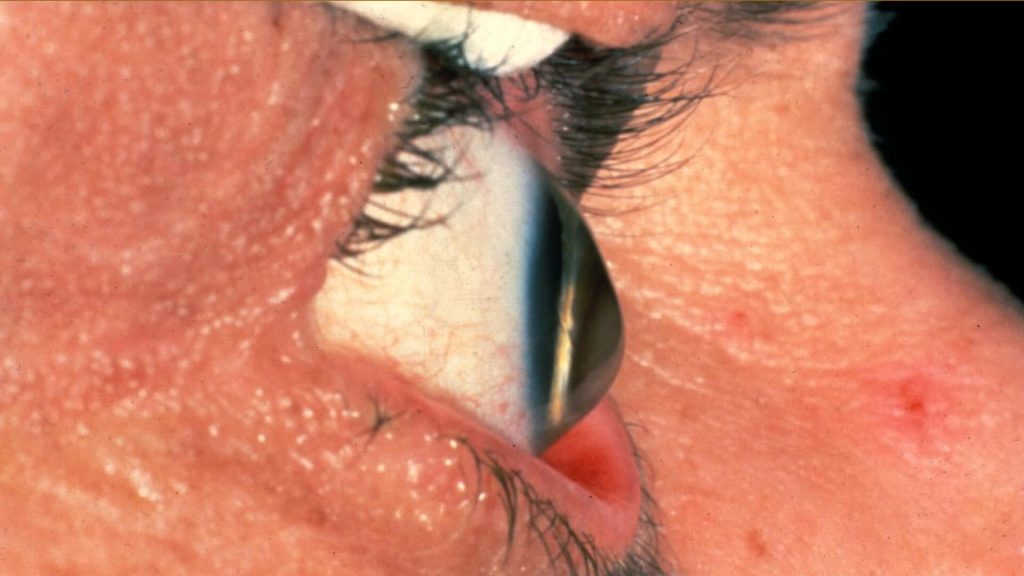Keratoconus is a progressive eye disorder that affects the shape of the cornea, the clear, dome-shaped surface of the eye that helps to focus light. In keratoconus, the cornea becomes thinner and bulges outward, causing distorted and blurry vision. While there is no cure for keratoconus, there are treatments available that can improve vision and quality of life for people with this condition.
One of the most common ways to improve vision with keratoconus is through the use of glasses or contact lenses. Glasses can correct mild to moderate keratoconus, while contact lenses are often required for more advanced cases. In some cases, specially designed contact lenses, such as rigid gas permeable (RGP) lenses or scleral lenses, can provide better visual correction and improved comfort for people with keratoconus.
Anothe rtreatment option is corneal cross-linking is a minimally invasive procedure that can help to strengthen the cornea and slow down the progression of keratoconus. During this procedure, eye drops containing riboflavin (vitamin B2) are applied to the eye, and then the eye is exposed to ultraviolet light. This causes the riboflavin to cross-link with the collagen fibers in the cornea, making it stronger and more stable.
Intacs are small, curved devices that are implanted in the cornea to help reshape it and improve vision. This procedure is often used for people with moderate to severe keratoconus who cannot be effectively treated with glasses or contact lenses. Intacs can help to reduce corneal irregularities and improve visual acuity, but they are not a permanent solution and may need to be replaced over time.
In severe cases of keratoconus, a corneal transplant may be necessary. During this procedure, the damaged cornea is removed and replaced with a healthy donor cornea. Corneal transplantation can be an effective way to restore vision in people with advanced keratoconus, but it is a major surgery that carries some risks, such as infection and rejection of the donor cornea.
There are several other treatments that can be used to improve vision with keratoconus, depending on the severity and progression of the condition. These include:
Topography-guided laser treatment: This procedure uses a laser to reshape the cornea based on a detailed map of its surface, obtained using a special imaging technique called corneal topography.
Hybrid contact lenses: These lenses are designed to provide the visual clarity of a rigid gas permeable lens, with the comfort of a soft contact lens.
Specialty eyeglasses: Glasses with special lenses, such as high-index lenses or aspheric lenses, can be used to improve vision in people with keratoconus.
In conclusion, while keratoconus can cause significant visual impairment, there are several treatments available that can improve vision and quality of life for people with this condition. Glasses, contact lenses, corneal cross-linking, intacs, corneal transplant, and other treatments can all help to restore visual clarity and reduce the progression of keratoconus. It is important to work closely with an eye care professional to determine the best treatment approach for your individual needs and circumstances.
At The Eye Center- Dr. Mahnaz Naveed Shah & Associates our team of eight ophthalmology subspecialists/ eye specialists, eye surgeons who are considered amongst the very best eye specialists in Karachi and in Pakistan, have the diagnostic and treatment capabilities to treat from the simplest to the most complex patients. We work hard to provide our patients with the best possible medical and surgical eye care, in a state of the art purpose built eye care facility. We offer the entire array of medical, laser and surgical treatments to help provide patients the best possible care in the most efficient, safe and ethical manner.
If you need an appointment, please contact us at 03041119544 during our working hours or leave us a WhatsApp message at +923028291799 and someone will connect with you. Walk-in appointments are also available for emergencies. We can also be reached through our web portal on www.surgicaleyecenter.org

